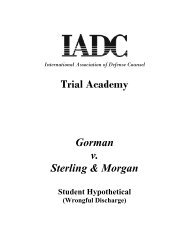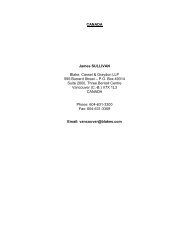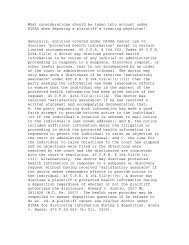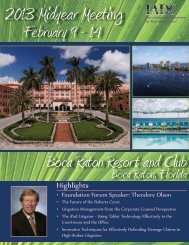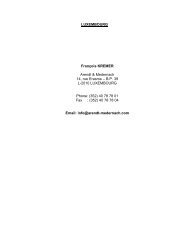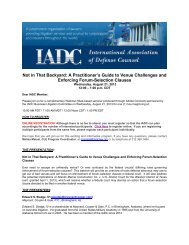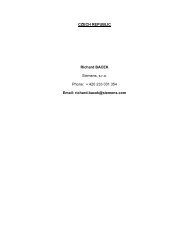Defense Counsel Journal - International Association of Defense ...
Defense Counsel Journal - International Association of Defense ...
Defense Counsel Journal - International Association of Defense ...
You also want an ePaper? Increase the reach of your titles
YUMPU automatically turns print PDFs into web optimized ePapers that Google loves.
The Global Supply Chain Page 429sources for fresh goods were interrupteddue to damage caused by the hurricane.As the most powerful storm that year,Hurricane Mitch damaged theinfrastructure <strong>of</strong> Honduras, Guatemala,and Nicaragua.As a result, the marketer lost salesand incurred increased costs in findingalternative sources. The marketerdiscovered that its competitors hadcontingency plans that were moreadvanced and the competitors were ableto secure alternative supplies. Themarketer could not recover the economicdamages under a property policy as thephysical damage was to non-ownedassets. That said, the TDI policy coveredthe lost revenues and increased costs dueto the break in the supply chain.D. Interpretation <strong>of</strong> CoverageOptionsTo develop an insurance portfolioand those coverages required to properlytransfer risk to an insurer, one must alsoconsider how these policies have beeninterpreted.1. Business InterruptionInsuranceCourts have held the “[t]he purpose<strong>of</strong> business interruption insurance is toindemnify the insured against lossesarising from inability to continue normalbusiness operation and functions due tothe damage sustained as a result <strong>of</strong> thehazard insured against. . . . In otherwords, the goal is to preserve thecontinuity <strong>of</strong> the insured’s earnings.” 56Courts have made a distinctionbetween a partial shutdown and a mereslowdown or loss <strong>of</strong> productivity; theformer is generally covered, while thelatter is not. In Howard Stores v.Foremost, the insurer denied coverage fora business interruption claim that aroseout <strong>of</strong> water damage because there was nosuspension <strong>of</strong> business. 57 Thepolicyholder manufactured men’sclothing and sold the clothing at variousretail stores it owned. One <strong>of</strong> the storessustained water damage. The propertydamage claim was not disputed and waspaid by the insurer.The policyholder also submitted aclaim for business interruption. Theinsurer denied the claim on the basis thatthere was no business interruptionbecause the policyholder continued to dobusiness. The policyholder thenreformulated its claim and asserted thatsince it had to divert inventories fromsome <strong>of</strong> its other retail stores, thepolicyholder failed to meet projectedsales in all three stores. The court heldthat recovery was properly deniedbecause there was no suspension <strong>of</strong>business and an alleged adverse effect oncontinuing sales did not constitutebusiness interruption. 58Similarly, in Quality Oilfields, thecourt held “[I]n sum, after considering thepolicy as a whole and persuasive56 Howard Stores Corp. v. Foremost Ins. Co.,82 A.D.2d 398, 400-401 (N.Y. Sup. Ct. 1981);see also Quality Oilfield Prods. v. MichiganMut. Ins. Co., 971 S.W.2d 635 (Mich. App Ct.1998).57 See Howard Stores, 82 A.D.2d at 676.58 Id.



